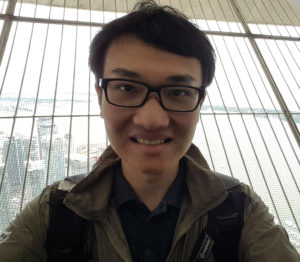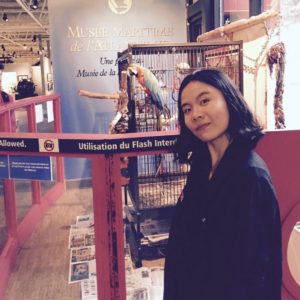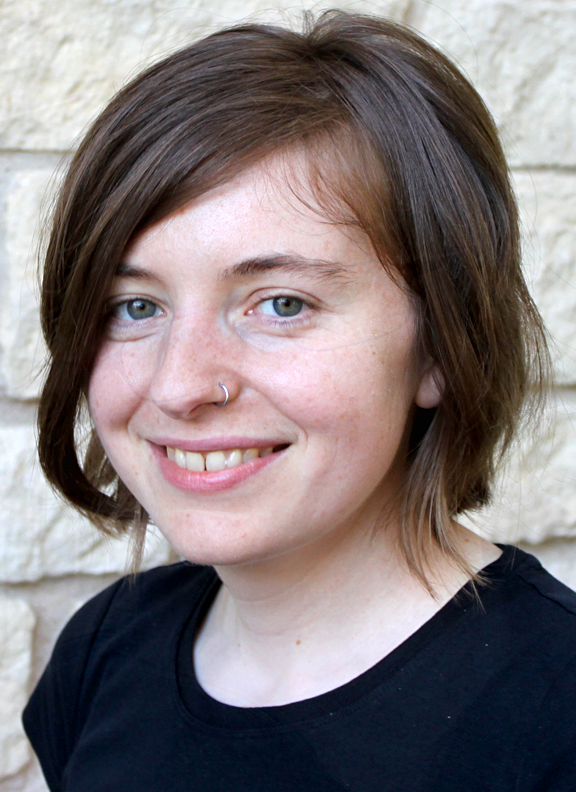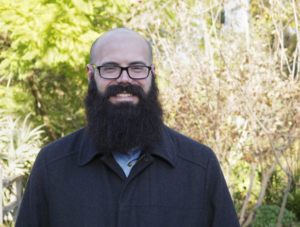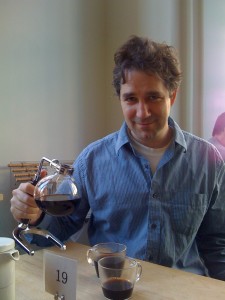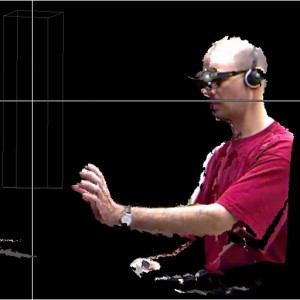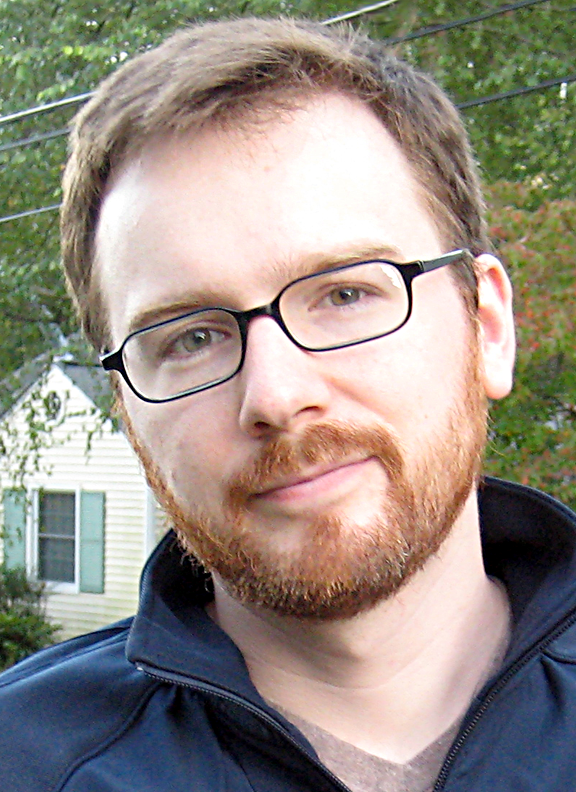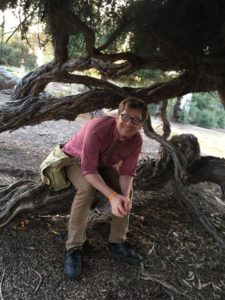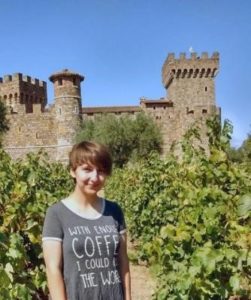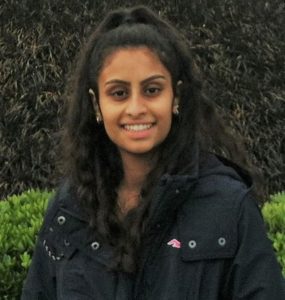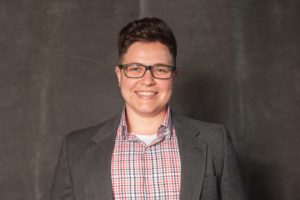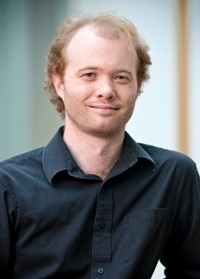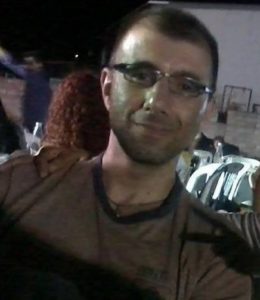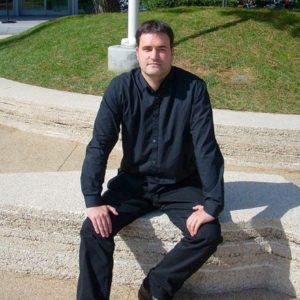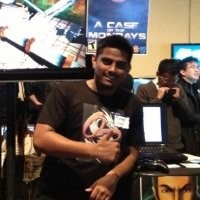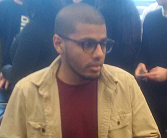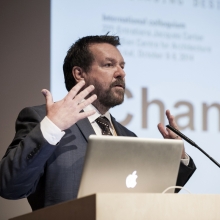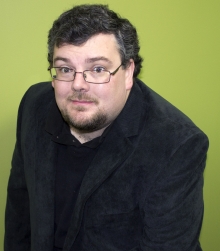IMMERSe Contributors
People
Carleton University
Chris Joslin
Chris Joslin is an Associate Professor at the School of Information Technology in Carleton University, Ottawa; he has been a Faculty Member since 2005. His research is mainly in video (capture, coding, and transmission), animation capture (face and body, marker and markerless), and audio reproduction (3D spatial audio and procedural audio). He is currently participating in a SSHRC Partnership Grant IMMERSe (dealing with a range of game related issues), a NSERC CREATE HeritageEngineering (focused on Architectural Heritage preservation), and an NSERC Discovery (next generation video coding). He is a member of several Technical Program Committees (Computer Graphics International [CGI], Computer Animation and Social Agents [CASA], Graphics Theory and Applications [GRAPP], IEEE Signal Image Technology and Internet Based Systems [SITIS]) as well as on the Editorial Board for the Journal of Scholarly Research Network Computer Graphics, and the Journal of Creative Interfaces and Computer Graphics. He is also a Canadian Delegate member for Standards Council of Canada (SCC) for Subcommittee 29, Working Group 1 and 11.
Ali Arya
Ali Arya has received a Bachelor’s Degree in Electrical Engineering from Tehran Polytechnic, Iran, and a Ph.D. in Computer Engineering from the University of British Columbia, Canada. With years of experience in industry as a software engineer and project manager, and also research and teaching positions in various academic institutions, since 2006 Ali has been with the School of Information Technology, Carleton University, Canada, where he is an Associate Professor of Interactive Multimedia. His research interests include Human-Computer Interaction, Educational Technologies, Computer Games and Virtual Worlds, Artificial Intelligence, Computer Graphics and Animation, and Digital Art. Ali’s research has been funded by National Science and Engineering Research Council (NSERC), Social Science and Humanities Research Council (SSHRC), Ontario Centres of Excellence (OCE), and industrial partners. Ali is the Associate Director of Graduate Studies in the School of Information Technology, and has played a key role in designing two new PhD and Master’s programs in Digital Media. He organizes a series of events and activities for his students such as the Global Game Jam, Creative Jam, and the Information Technology seminars. Ali is senior member of IEEE, a member of ACM, and on the editorial board and technical committees of various journals and conferences in the areas related to his research.
Erin Martel
Erin Martel is a master’s candidate in the Human-Computer Interaction program at Carleton University. She has been a game designer for over 10 years and her professional background in the game industry informs her research interests. Erin is working with researchers at Carleton to evaluate the player experience in virtual reality games. While virtual reality offers an inherently immersive experience that promotes presence and engagement, Erin is currently studying how self-avatar graphical and motion fidelity can further enhance the player experience. She is also conducting an ongoing project to evaluate the effect of VR control schemes on player performance and experience.
Feng Su
Feng Su is a PhD candidate in the Department of Systems and Computer Engineering at Carleton University. He received a B.Eng. degree in Electrical Engineering and an M.A.Sc degree in Human-Computer Interaction. His research interests are in the areas of procedure audio, acoustic imaging, digital signal processing, and computer animation. Currently, he is working on procedurally generated sounds for soft-bodies, where he explores various methods for automatically synthesis of realistic sounds for soft-body interactions in physically-based animation and virtual environments.
Tashia Nasir
Tashia Nasir is a Master’s student of Human computer interaction (HCI) at Carleton University, Ottawa. She holds a Bachelor’s degree in Electronics Engineering. She has a keen interest in Software Development, Human Computer Interaction, Digital Image Processing, Artificial intelligence and Machine Learning. She has worked as a Developer for Moodle based Learning Management System and has completed Embedded Systems projects as part of her academics. Her primary research interests are Digital Image Processing and Computer Vision.
Zhao Zhao
Zhao Zhao is a PhD candidate in department of System and Computer Engineering, Carleton University. Her research focuses on using wearable and gamification technologies to promote people’s daily activity. She found based on existing technologies and user needs, the idea of employing off-the-shelf wearable activity trackers for gamification of exercise and fitness is feasible, motivating, and engaging.
She further noticed it’s important to generate customized workout sessions to fit different user’s physical condition and interests. Thus, she extended her research to better understand people’s daily activity pattern with machine learning and player modeling. In her latest research, a gamified 24/7 personal fitness assistant system is introduced, it 1) tracks and recognizes user’s 24/7 activity and learns its pattern, 2) provides intelligent recommendations on certain sessions of exercise (including the proper time, location, the type of exercise and intensity, etc.,) and 3) uses player modeling and recommender system techniques to generate customized gameplay experience for each individual user.
Concordia University
McMaster University
Faculty
Jacques Carette
Lab Supervisor
Jacques Carette is an Associate Professor in the Department of Computing and Software. He has dual interests in very formal endeavours (mechanized mathematics, correct–by-construction software and meta programming) as well as more applied work — game design, with some forays in the areas of ‘live coding’ (for music) as well as 3D videos (also for music).
In game design, his main interests are visual scale and user experience. Visual scale refers to the impact of the size of the display on the whole gaming experience; understanding the design space well enough to understand of the “user experience” can be held constant across scale is one important research thread. More generally, what are the psychomotor and cognitive components of the “user experience” of video games is very interesting.
Sometimes, these two strands intersect, such as when code generators are written for producing game families, task analyses are used to generate optimal UIs, or when careful analyses of gaming principles are used as requirements for game design analysis tools.
Andrew Mactavish
Lab Supervisor
Andrew Mactavish’s primary line of research focuses on digital games and digital gaming culture. In 2009, he was awarded a five-year grant from the Canada Foundation for Innovation, in collaboration with Jacques Carette (Engineering) and Jeff Trzeciak (Library), to study visual scale in digital games and to apply their findings to the design of “serious” games. His previous research on games has focused on the participatory elements of digital gameplay and gaming communities, and the performative pleasures of interacting with special effects technology. His other research interests include digital photography and digital media design.
Graduate Students
Geneva Smith
M.A.Sc. Candidate, Software Engineering
May 2014 – April 2017
Geneva is a Masters student who completed her undergraduate studies in the Software and Game Design program at McMaster University. Her thesis is exploring the possibility of implementing human emotions into non-player characters to enhance player engagement and entertainment.
 Sasha Soraine
Sasha Soraine
M.A.Sc Candidate, Software Engineering
January 2016 – Present
Sasha graduated from McMaster’s Software Engineering and Game Design program. Her research interests center around video game specific HCI problems. Currently, she is working to understand the link between cognitive systems and gameplay challenge types.
Pavanjot Gill
M.Eng Candidate, Software Engineering
September 2016 – Present
Pavanjot is interested in taking video game interfaces (Heads-Up Display) designed for a single screen and reconfiguring them to support split-screen multiplayer games. The goal is to have the HUD take as little space as possible for each player but still retain all of the essential information the player needs.
Adrian Sciga
M.A.Sc Candidate, Software Engineering
September 2016 – Present
Adrian completed his undergraduate studies in the Software Engineering and Game Design program at McMaster University. His research interests centre around procedural generation in games. Currently he is exploring procedural story generation for a family of games.
University of California – Davis
Faculty/ Post Doc
Gina Bloom
Gina Bloom is associate professor of English at the University of California, Davis, where she is the Project Director for Play the Knave, a motion-sensing digital game about Shakespeare performance. She is the author of Voice in Motion: Staging Gender, Shaping Sound in Early Modern England (Penn Press, 2007) and serves as a Trustee for the Shakespeare Association of America. Her work on games and theater has been published in Shakespeare Quarterly, Shakespeare Bulletin, Theatre Survey, and numerous edited collections, and her book Gaming Theater: Interactive Play Before Digital Media is forthcoming from the University of Michigan Press.
Stephanie Boluk
Stephanie Boluk is an assistant professor in the English Department and the Cinema and Digital Media Program at University of California, Davis. Her research and teaching incorporate game studies, media studies, utopian studies, and critical theory to explore videogames, electronic literature, alternative currencies, finance capitalism, and the convergence of leisure and labor in contemporary information economies.
Jordan Carroll
Jordan Carroll is a postdoctoral scholar and Associate Director of ModLab at the University of California, Davis. He received his Ph.D. in English with a Designated Emphasis in Critical Theory at the University of California, Davis. His current project examines the culture of video gamers, computer programmers, science fiction fans, and other so-called geeks through the lens of the temporal turn in queer theory. At ModLab, he has worked with the Critical Wearables research group on the cultural and social dimensions of fitness tracking and other wearable devices. His work has appeared in journals including American Literature and The Journal of the Fantastic in the Arts.
Joe Dumit
Joe Dumit is the Director of the Institute for Social Sciences, Chair of Performance Studies, Professor and former director of Science and Technologies Studies and Professor of Anthropology at the University of California, Davis. He is also on the faculty of the Cultural Studies PhD program. He is in the process of launching an undergraduate program in Data Studies, helping undergraduates learn to think critically and computationally about data. His most recent book is on pharmaceutical marketing and clinical trials called Drugs for Life: How Pharmaceutical Companies Define Our Health (Duke University Press, 2012). He helped found the ModLab through the Davis Humanities Institute. He has been running workshops on rethinking your research through game design, and he is developing a game on fracking.
Kris Fallon
Kris Fallon is a film and digital media scholar whose research focuses on non-fiction visual culture across a range of platforms, from still photography to data visualization.
His essays on digital technology and documentary have recently appeared in Film Quarterly and Screen, and are forthcoming in several edited anthologies. Before coming to Davis, he played an active role in the early stages of both the Berkeley Center for New Media and the CITRIS Data & Democracy Initiative at UC Berkeley, where he received his Ph.D.
He is currently working on a book entitled Where Truth Lies: Digital Culture and Documentary Film After 9/11.
Oliver Kreylos
Oliver Kreylos is an associate researcher at the University of California, Davis. He received his Ph.D. in Computer Science from the University of California, Davis, and his M.A. in Computer Science from the Karlsruhe Institute of Technology.
Patrick LeMieux
Patrick LeMieux is a game designer and media theorist. Recent projects include Speculation (http://speculat1on.net), an alternate reality game that explores the culture of Wall Street investment banks in the context of the 2008 global economic crisis, and Open House (http://no-place.org), a telematic installation which allows visitors to virtually squat in a Florida home undergoing foreclosure after the U.S. housing collapse. He has published extensively on game studies, critical code studies, and media technologies in journals such as Critical Inquiry and Digital Humanities Quarterly. His book Metagaming: Playing, Competing, Spectating, Cheating, Trading, Making, and Breaking Videogames was published by the University of Minnesota Press in 2017.
Colin Milburn
Colin Milburn is Gary Snyder Chair of Science and the Humanities and Professor of English, Science and Technology Studies, and Cinema and Digital Media at the University of California, Davis. He directs the Science and Technology Studies Program as well as the ModLab digital humanities laboratory. His research focuses on the relations of science, literature, and media technologies. He is the author of Nanovision: Engineering the Future (2008), Mondo Nano: Fun and Games in the World of Digital Matter (2015), Respawn: Gamers, Hackers, and Technogenic Life (2018), and numerous other writings about science fiction, video games, and the history of science.
Michael Neff
Michael Neff is an associate professor in Computer Science and Cinema & Digital Media at the University of California, Davis where he directs the Motion Lab, an interdisciplinary research effort in character animation and embodied input. He holds a Ph.D. from the University of Toronto and is also a Certified Laban Movement Analyst. His interests include character animation tools, especially modeling expressive movement, physics-based animation, gesture and applying performing arts knowledge to animation. He received an NSF CAREER Award, the Alain Fournier Award for his dissertation, best paper award from Intelligent Virtual Agents and Motion in Games and the Isadora Duncan Award for Visual Design. He also currently serves as Chair for the Department of Cinema and Digital Media.
Graduate Students
Treena Balds
Treena Balds conducted her doctoral studies in English at UC Davis. Her interests include early C20 literature, science, philosophy, and particularly the formalisms via which these disciplines achieve an interdisciplinary connection with each other. She has recently completed her dissertation on the mathematical subject in works by Samuel Beckett.
Evan Buswell
Evan Buswell PhD candidate in Cultural Studies at UC Davis, where he works at the UC Davis ModLab as the lead programmer on several games and code art projects. Before entering graduate school he wrote code for the software industry. Evan’s current project investigates the relationship between the development of the capitalist credit system and the formation of code and algebraic notation. In 2015, Evan was a UCHRI Fellow in Residence for the “Culture|Finance|Capital” working group at UC Irvine.
Ofir Cahalan
Ofir Cahalan is a first year PhD student in English at the University of California, Davis. He specializes in early modern English literature, specifically Shakespeare studies, as well as the digital humanities. His favorite play is The Merchant of Venice. He is currently working on the Play the Knave project.
Ranjodh Singh Dhaliwal
Ranjodh Singh Dhaliwal did his undergraduate degree in Computer Science and Engineering from IIT Indore, studied English at University of Chicago, and is now pursuing his PhD in English at UC Davis. His research interests revolve around contemporary art and literature, science and technology studies, media theory, and videogame studies.
Ksenia Fedorova
Ksenia Fedorova is a PhD candidate in Cultural Studies at the University of California, Davis. She received a B.A. and M.A. in Philosophy at Ural State University and a M.A. in Art History at University of Colorado, Boulder, as well as a PhD (kandidat nauk) in Philosophy/Aesthetics at Saint-Petersburg State University. Her research interests include wearable technology.
Sawyer Kemp
Sawyer Kemp is a doctoral candidate studying 17th and 18th Century drama and contemporary performance. Their dissertation investigates the many valences of “accessibility” in contemporary Shakespeare performance. They currently collaborate with the UC Davis ModLab on the motion-capture performance project Play the Knave, a Shakespeare video game with installations at the Stratford Festival in Ontario, the Utah Shakespeare Festival in Cedar City, and the African American Shakespeare Company in San Francisco.
Alina Kontareva
Alina is a Fulbright Visiting Doctoral Student at UC Davis. She holds a Master’s Degree in Linguistics and Anthropology, and she is a Doctoral Candidate with the European University at St. Petersburg, Russia. Alina specializes in the social studies of science, technology and innovation. She is currently leading a research project centered on Instagram and visualization of big data. Alina plans to further her research in computational methodology in order to utilize machines to better record and analyze qualitative content in the fields of humanities and social sciences.
Evan Lauteria
Evan W. Lauteria is a PhD candidate in Sociology at the University of California-Davis. An organizational and cultural sociologist, Lauteria’s work has focused on the industrial production of video game culture, particularly around LGBTQ representation. He is the co-editor of Rated M for Mature: Sex and Sexuality in Video Games (Bloomsbury Press 2015), and his work appears in Reconstruction and Analog Game Studies. In the UC-Davis ModLab, Lauteria works on data analytics for the Shakespeare karaoke game Play the Knave, design management for the corporation simulator Frack the Game, and content analysis for the LGBTQ Video Game Archive (lgbtqgamearchive.com). His dissertation explores the history of the Japanese video games industry during the “console wars” in the 1980s and 90s, drawing on archival sources from North America, Western Europe, and Japan.
Nick Toothman
Nick Toothman is a computer science PhD candidate and member of the character animation research group and the ModLab at UC Davis. His research focuses on interactive shape control for character meshes, particularly in the areas of virtual reality, skinning, input modalities, performance, and artist tools. He developed the avatar body tracking for the ModLab’s project Play the Knave. In recent years, his interests have steered him towards virtual reality as a platform for computing, socializing, and entertainment. His ongoing goal is to help build the foundation that allows everyone to enjoy the infinite possibilities of VR.
Emma Leigh Waldron
Emma Leigh Waldron is a PhD student in the Performance Studies Graduate Group at the University of California, Davis, and Co-Editor-in-Chief at the online journal Analog Game Studies. She holds an MA in Performance Research from the University of Bristol, and a BA in English from Rutgers University. Emma’s research focuses on affective communities that coalesce around intimate performances of touch. She is currently researching the mediated intimacy of ASMR videos on YouTube, and how sex is represented in larp (live-action role-playing games). She is especially interested in how definitions and manifestations of sexuality are negotiated, reified, and transformed through these practices. Her work lies at the intersection of performance studies and media studies, as it questions the role of embodiment in sexuality, intimacy, and touch. Her work is informed by feminist theory, queer theory, affect studies, and phenomenology. She can be reached at ewaldron@ucdavis.edu.
John Zibell
John Zibell makes media/physical artworks for theatre, cinema, gallery, and the street examining the collision of virtual with actual bodies. He worked and trained as an actor and director for many years in New York with Mike Nichols, Paul Sills and Andre Gregory.
John is a Master of Fine Arts directing candidate in the Department of Theatre and Dance at UC Davis, where he directed A Midsummer Night’s Dream, assistant-directed and performed in Guillermo Gomez-Peña’s Corpo-Ilicito: The Post Human Society 6.9 and Anna Fenemore’s The Matter of Taste. John also created video for Gallathea and Body of Knowledge, directed by Peter Lichtenfels and Karl Frost respectively.
Undergraduate Students
Sarah Asnaashari
Sarah Asnaashari is a recent graduate from the University of California, Davis, and has interned with ModLab’s Play the Knave for two years as a script writer, play tester, and researcher. Her academic studies have focused on Medieval to Early Modern writing as well as Children’s Literature, a subject for which she completed an Ungraduated Honors Thesis. She aspires to become a children’s novelist and intends put her years of Shakespeare study to good use in her writing endeavors.
Raeanne Baird
Raeanne Baird is a third year English major interested in pursuing a career in the entertainment field. She hopes to work in writing, editing, and marketing after graduation. This will be her second year working with the Play the Knave team as a script editor.
Alison Blecman
Alison Blecman is an undergraduate student at UC Davis pursuing degrees in English with an emphasis in literary criticism, and in History, with an emphasis in medieval Europe and the modern Middle-East. On campus, she is involved in the Gender and Sexuality Commission, and runs a weekly gathering every Friday for members of the commission. She interned for Play the Knave originally as a script writer and editor and has since moved on to manage social media.
Rebecca Fong
Rebecca Fong is a senior undergraduate student at UC Davis, pursuing a double major in English and Psychology, with a minor in Asian American Studies. She has worked for the past three years as a Peer Advisor for the English Department and President of the Beyond the Book Club, which is the official English Club at UC Davis. She currently works with English Professor Gina Bloom on Play the Knave as a play-tester and audio research intern. In her free time, she likes to play videogames (especially Nintendo), read manga, and learn about social justice.
Robert Fox
Robert Fox is an undergraduate major in English at the University of California, Davis. He works on Play the Knave as a Play-testing and Script-writing intern. He hopes to make a career in the video game industry.
Mira Pranav
Mira is an Economics and English double major at UC Davis, hoping to minor in Music. She has been on the Play the Knave team for six months. She leads the development for the game’s music and sound, and assists in script editing. Mira plans to attend law school after graduating in 2019.
Karla Quezada
Karla Quezada is a 4th year English and Linguistics double major at UC Davis. She is interested in theory – be it syntactical or literary – modernist works of literature, and the intersection of computer science with the humanities and social sciences. Karla currently interns with Play the Knave as a script editor and playtester.
Amanda Shores
Amanda Shores is a senior English major. She is the head intern for the Play the Knave pedagogy team, working with Professor Gina Bloom to integrate the game into classrooms. She is also a lead tutor for the Davis Bridge program, an after school program for underserved students in the Davis school district.
Holly Simpson
Holly Simpson is a 4th year English major whose interests include liminality in Irish literature, especially as it relates to gender and sexuality. She plans to complete an honors thesis on At Swim, Two Boys that examines the non-binary aspects of Irish society, focusing on the turbulent time period of the 1916 Easter Rising. After completing my Bachelor’s Degree, she hopes to go on to obtain a Master’s in Library and Information Science.
Marissa Trujillo
Marissa Trujillo is a fourth-year English major/Professional Writing minor hoping to achieve a career in literary publishing. Her main areas of interest in the literary world are medieval and early modern works. When she took project director Gina Bloom’s Shakespeare course last year, she discovered Play the Knave and realized that there is still a demand for Shakespearians in the modern world. As a scriptwriting intern, member of the social media team, and audio analyst, she has developed a passion for preserving the great works of the past in the ever-changing world of new media.
Karen Xu
Karen Xu is an undergraduate English major at the University of California, Davis. She works on the Play the Knave project and she is graduating in 2017.
Intern
Raul Castellanos
Raul Castellanos is a pedagogy intern for Play the Knave. He is from San Diego and is currently a fourth-year undergraduate English major here at UC Davis. He is preparing to enter a credential program and plans to teach high school English. He writes short stories and has recently begun working on a novel. His hobbies are writing, biking and traveling.
Alumni
Amanda Phillips
Amanda Phillips is Assistant Professor of English at Georgetown University, affiliated faculty in Film and Media Studies, and the co-facilitator of the American Studies Association Digital Humanities Caucus. She writes about race, gender, and social justice in videogames and the digital humanities. You can find her work in Queer Game Studies, Games and Culture, Digital Creativity, and Debates in the Digital Humanities.
Josef Nguyen
Josef Nguyen is an assistant professor of game studies in the School of Arts, Technology, and Emerging Communication at the University of Texas at Dallas. His research engages science and technology studies and media studies, focusing on the politics of play, toys, and games. His current work investigates contemporary debates regarding creativity, children, and digital media. Previously, he completed a Ph.D. in English at the University of California, Davis, where he was active in research in game studies and design through the ModLab and IMMERSe.
University of Ontario Institute of Technology (UOIT)
Faculty Members
Andrew Hogue
Dr. Andrew Hogue is the Program Director and Associate Professor of the Game Development and Entrepreneurship program at the University of Ontario Institute of Technology (UOIT). Through his past involvement in the Immersive Visual environment project at York (IVY), he has gained interests in psychophysics, stereoscopic 3D, and levels-of-realism for immersion. As part of IMMERSE, Dr. Hogue actively investigates immersive technologies such as virtual-reality (VR), augmented-reality (AR) and mixed-reality (MR) environments and their effects on humans. He is currently studying the use of tangible interfaces for the design and development of interactive content and is studying user experience models and the interaction of technology on the user experience for designing better VR experiences.
Alvaro Joffre Uribe Quevedo
Dr. Alvaro Joffre Uribe Quevedo is an Assistant Professor at the University of Ontario Institute of Technology. He received his bachelor’s degree in Mechatronics Engineering from Universidad M. Nueva Granada – Colombia, followed by a Master and Doctoral degree in Mechanical Engineering from the State University of Campinas – Brazil. In September 2016 he concluded his Post-Doctoral appointment at the Games Institute at the University of Waterloo conducting research on the effects of games in medical training. Prior to joining UOIT, he worked as an Assistant Professor at Universidad M. Nueva Granada where he conducted research on exergames, medical simulation and immersive virtual reality in medical procedures. His research interests are in virtual reality towards the development of applications that take advantage of immersion and interaction while designing and employing emerging technologies and game elements in training and learning scenarios.
Bill Kapralos
Bill Kapralos is an Associate Professor at the University of Ontario Institute of Technology. His current research interests include: immersive technologies, serious gaming, multi-modal virtual environments/simulation/reality, the perception of auditory events, and 3D (spatial) sound generation. He has been invited to speak on the topic of immersive technologies, virtual simulation, and serious gaming for medical education at numerous international events. At the invitation of the Federal Republic of Germany, he took part in the week-long “Electronic Start-Up: Industry 4.0 in Germany, Country of Innovation”, Visitors Programme in August 2016. He is a past recipient of an IBM Centers for Advanced Studies Faculty Award, a past co-recipient of a Google Faculty Award, and a past recipient of a Natural Sciences and Engineering Research Council of Canada (NSERC) and Japan Society for the Promotion of Science (JSPS) Fellowship to conduct research in Japan. He recently completed a two-month stay at Shizuoka University in Hamamatsu, Japan, as a Visiting Research Fellow and Guest Professor as part of this Fellowship.
Student Members
Brent Cowan
Brent Cowan is currently a PhD Candidate in Computer Science at the University of Ontario Institute of Technology (UOIT) under the supervision of Dr. Bill Kapralos. He holds a Master’s degree in computer science and a Bachelor of Information Technology degree specializing in game development. Brent became involved in research as an undergrad developing real-time acoustical modeling algorithms which resulted in several peer reviewed publications. Since then, he has made contributions to a variety of fields including serious games, simulation, computer graphics, and artificial intelligence (AI). His current research will allow virtual environments of all types including 2D and non-polygonal environments, to have believable spatial audio. In addition, this new system will provide a sense of hearing for AI controlled non-player characters (NPCs).
Geoffrey Gaudi
My name is Geoffrey Gaudi and I am a graduate student at the University of Ontario. We are partnered with McMaster University. My thesis is on Neuroplasticity, Serious Games and Autism. Autistic children often have trouble with social communication and may not develop language. I am interested in games that aim to change or rewire children’s brains. We are really at the beginning of a complex field. I am also interested in the pleasure center of the brain and its connection to video games. I am interested in research that explores a connection of the player to the game; the creation of a fun or exciting experience. My generation grew up on the original NES console (happy times) and one of my favorite games was Metroid. I would like to use Emotiv or NeuroSky in my future research as I will be able to peer into my own brain.
Michael Gharbharan
Graduate of the Game Development and Entrepreneurship at UOIT. Currently working on a MSc which investigates the use of tangible interfaces and spatial augmented reality as means to develop digital prototypes of animated sequences. The goals of the work are to develop and evaluate a system which aims to reduce iteration time and make the creation of virtual environments and animations more accessible.
Zain Khan
Zain Khan received his MSc in Computer Science under the supervision of Dr. Bill Kapralos at the University of Ontario Institute of Technology in 2015. During his Master’s, Zain developed a web-based low-fidelity serious-gaming framework called Fydlyty, that allows health-based professionals and students to learn cultural competence skills. His other work involves the development of an internet-based educational networking tool called OPEN, that enable trainees to develop relationships, foster connections, and share simulation-based experiences in an interactive manner. Zain also has extensive experience working with web and digital technologies. Currently, he enjoys being part of the digital media team at Hill+Knowlton Strategies where he is responsible for implementing web initiatives for Hill+Knowlton Strategies and their clients including websites, web applications; and native mobile and tablet applications.
Mohammed Melaisi
Mohammed Melaisi is a Master’s of Computer Science graduate student in the Faculty of Science at the University of Ontario Institute of Technology, Oshawa, Canada. His research interests include multi-modal interactions, haptic interface, human computer interaction, serious games and human perception. He is working currently on analyzing the effect of sound on haptic devices fidelity.
Robert Savaglio
Robert Savaglio is a 3rd year undergraduate student in the Game Development and Entrepreneurship program at the University of Ontario Institute of Technology. He is interested in video game programming, video game design, and computer graphics. He has attended the Level-Up Student Game Showcase twice, for his games High Schooled and Dodge Bomb, and has received awards at the UOIT Games-Con for Best Game Aesthetics(2016), Best Gameplay(2017), Player’s Choice 2nd Year Game(2017), and Best of Show(2017). He also presented his game Dodge Bomb at the AMD student showcase in April 2017. He is interested in serious games for medical education, and is currently researching the suitability of the Microsoft HoloLens and augmented reality for medical practice and education.
University of Waterloo
Faculty Members
 Beth Coleman
Beth Coleman
Associate Professor, English Language and Literature
Beth Coleman is co-director of the Critical Media Lab at the University of Waterloo, and participates in the Rhetoric & Professional Writing major as well as the Master of Arts in Experimental Digital Media. She specializes in digital media, race theory, game culture, and literary studies. She researches and creates media design on virtual worlds, x-reality, geofilms, machinima animation, and race as technology.
 Karen Collins
Karen Collins
Associate Professor, Drama and Speech Communication
Karen Collins’ research is diverse and interdisciplinary, but has always had a central focus: the interaction of humans and machines, specifically as related to sound. Her research is driven by the following questions: What does it mean to interact with sound? In what ways do people interact with sound? And, how does interactive sound change our association to, our involvement with, and our experience of media? Although her primary focus has been interactive sound in video games, she has also applied her theories and methods to mobile phones, computer interfaces, slot machines, and product design. Her research spans across the fields of music, audio engineering, acoustics, computer science (information retrieval, human-computer interaction), interaction design, sound design, film studies, cultural theory, game design/development, and areas of philosophy and psychology.
Contact Information:
colinsk@uwaterloo.ca
519-888-4567 x38326
Karen’s English Department profile
Karen’s Drama and Speech Communication profile
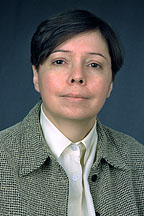 Chrysanne Di Marco
Chrysanne Di Marco
Associate Professor, Artificial Intelligence Group (David R. Cheriton School of Computer Science) Cross Appointment, English Language and Literature
Chrysanne Di Marco has been a member of the Artificial Intelligence Group since 1990. She is also project leader of the HealthDoc project, which works to develop natural language generation systems for producing multimedia health information tailored to medical conditions and patient characteristics. Her current research includes: a project to formalize an ontology of rhetorical figures for use in computational natural language applications, an automated text-messaging system to promote breast feeding in new mothers, and an automated personalized Virtual Sleep Coach.
Contact Information:
519-888-4567 x84443
Cheriton School of Computer Science Profile
Colin Ellard
Associate Professor, Department of Psychology
Colin Ellard is a psychologist researching neuroscience. His interests include how the organization and appearance of natural and built spaces affects movement, wayfinding, emotion, and physiology. He directs the Urban Realities Lab at the University of Waterloo.
Contact Information:
Mark Hancock
Associate Director, The Games Institute; Associate Professor, Management Sciences
Mark Hancock is the Associate Director of the Games Institute. He is also an associate professor in the Department of Management Sciences in the Faculty of Engineering, where he directs the Touchlab.
He conducts research in human-computer interaction, games, multi-touch interaction, 3D interaction, virtual/augmented/mixed reality, collaboration, computer-supported cooperative work, tabletop displays, and large-screen displays.
Mark’s Management Sciences profile
Personal website
Kevin Harrigan
Kevin Harrigan is a member of the University of Waterloo’s Canadian Centre for Arts and Technology (CCAT). He teaches courses in multimedia and computer-game design in the Digital Arts Communication (DAC) program, and has been a technical expert witness in legal cases regarding Electronic Gaming Machines (EGMs). His research interests include: Percentage and Returns (PAR)Sheets, near misses, computer algorithms used to misrepresent slot machine game outcomes, limitations of random number generators (RNGs), and gaming regulations/policies.
Jason Hawreliak
Assistant Professor, Game Studies, Brock University
Jason Hawreliak received his Ph.D. in English from the University of Waterloo. His research examines rhetorics of heroism and immortality in videogames. Other research interests include multimodal rhetoric and the psychological function of digital media. He is the Faculty Advisor to the Games Institute’s First Person Scholar.
Fue-Sang Lien
Professor Fue-Sang Lien has over 20 years of research experience in Computational Fluid Dynamics (CFD) and Turbulance Modelling. His expertise lies in using simulations (namely, Computational Fluid Dynamics) in virtual worlds to train first responders in response to chemical, biological, radiological, nuclear and explosive catastrophic events, and is interested in working on improving the learning experience by employing serious game technologies.
Contact Information:
 Kristina Llewellyn
Kristina Llewellyn
Kristina R. Llewellyn is the Principal Investigator of Digital Oral Histories for Reconciliation (www.dohr.ca): The Nova Scotia Home for Colored Children History Education Initiative, a project funded by the Social Sciences and Humanities Research Council of Canada. Her research and teaching areas include: VR and history education; equity and education; youth civic engagement; restorative approaches to learning; and oral history. She is the author/co-editor of Oral History and Education: Theories, Dilemmas, and Practices; The Canadian Oral History Reader; and Democracy’s Angels: The Work of Women Teachers.
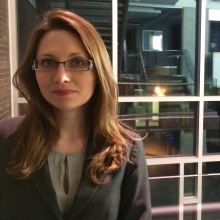 Ashley Rose Mehlenbacher
Ashley Rose Mehlenbacher
Assistant Professor, Department of English Language and Literature
Professor Mehlenbacher is an Ontario Early Researcher Award holder who specializes in science communication, citizen science, and expertise in multidisciplinary teams.
 Lennart Nacke
Lennart Nacke
Courses taught
- (UX) User Experience Fundamentals and User Research
- Introduction to Game Design
- Design and User Experience of Games
Research and teaching interests
Gamification: Involves the use of game design principles in systems that primarily support non-game tasks, with the goal of increasing fun, engagement and motivation. Dr. Nacke has been involved in the definition of the term and leading the academic movement in workshop and conference settings. His students have created several games that were deployed outside of gaming contexts, such as finance, social networks, and fitness.
Games user research: Developing new methods and tools for improving player testing and user research in games and entertainment systems. Dr. Nacke works closely together with the International Game Developers Association Special Interest Group on Games User Research and he has served on their steering committee in the past.
Games for human health and fitness: Making sports, physiological exercise, and health applications more playful has become one of Dr. Nacke’s recent research focus areas, especially in light of the recent increase in sensor use and the quantified self movement. As part of this, he has investigated how to foster healthy habits, such as sticking to a fitness routines and engaging older adults with technology. His students have developed their own apps and his research team has worked with companies such as Ayogo Health, Inc. in Vancouver, British Columbia, to analyze social health games on Facebook. A recent Engage grant with Vintage Fitness in Toronto supported a project to develop a gamified online fitness service to keep older adults fit and healthy.
HCI for games: Finding novel sensors and interaction paradigms that drive the manner in which we interact with computers in a meaningful
and engaging way.
Affective gaming: Research using psychophysiological analysis and physiological sensors to track player sentiments when gauging engagement, cognition and player emotions.
Social relationship-building games: Developing games and installations that can be used in public spaces to build relationships and foster social interaction in groups.
Link to official department profile
Link to Stratford campus profile
For more information, please see Dr. Nacke’s HCI Games Group and his publications.
 Isabel Pedersen
Isabel Pedersen
Associate Professor, Communication Studies, UOIT
Dr. Isabel Pedersen, Director of the Decimal Lab at UOIT and Canada Research Chair in Digital Life, Media, and Culture, studies the societal impact of human-computer interaction.
She concentrates on personal devices such as carryable, wearable, and implantable technologies within rhetorical, political, cultural, pedagogical, and artistic contexts. She is the author of Ready to Wear: A Rhetoric of Wearable Computers and Reality-Shifting Media.
Her research into games concentrates on wearable technology, visual rhetoric, and participatory culture, particularly for children. Currently, she is working on cataloging technological innovations in videos game narratives for inclusion in the Fabric of Digital Life digital humanities archive.
Contact Information:
 Neil Randall
Neil Randall
Associate Professor, English Language and Literature
Director of The Games Institute
In addition to directing The Games Institute, Neil Randall has also earned large grants for The Interactive and Multi-Modal Research Syndicate (IMMERSe) and the Waterloo Game Analysis and Monitoring Environment (WatGAME). He is the Faculty Advisor to the Games Institute’s First Person Scholar. He helped establish the undergraduate Rhetoric and Professional Writing program, and graduate programs in Rhetoric & Communication Design, and Experimental Digital Media. In practice, he consults for various technology companies on digital media creation, methods of effective communication, proposal writing, copyright and patent issues, and public relations.
Neil’s English Department profile
Currently supervisor of: Emma Vossen, Becky Anderson, Chris Lawrence, George Ross, Judy Ehrentraut, Nicholas Hobin, Betsy Brey, Alexandra Orlando, Ryan Clement, Cassandra Arthur, Quinn Powell.
Contact information:
Stacey Scott
Assistant Professor, Systems Design Engineering Cross Appointment, English Language and Literature
Stacey’s research and teaching interests are human-computer interaction and computer-supported collaboration. She specializes in digital tabletop computer technology and advocates for digital tabletop technology to support collaboration. She co-founded the Natural Sciences and Engineering Research Council of Canada (NSERC) SurfNet, a network focused on tabletops and interactive surfaces, and LEIF: A Multicultural Exploration into Research and Education for Surface Computing, an exchange program between Canadian and European universities for students to work on digital surface research projects.
Contact Information:
Stacey’s English Department profile
 Jennifer Whitson
Jennifer Whitson
Assistant Professor, Sociology and Legal Studies
Jennifer Whitson is the Research Advisor for Execution Labs, an accelerator and investment platform for indie game studios, as well as an affiliated faculty member with the Technoculture, Art and Games Research Centre (TAG) at Concordia University. Jennifer Whitsonfocuses on games, play, and surveillance. She studies the shifting production models of the global game industry to trace how risk management practices, datamining, and digital distribution shapes developers’ creative work and the larger cultural role of games. Apart from teaching a games development course at the UW Stratford Campus and games studies in the department of Sociology and Legal Studies, Jennifer also conducts studio studies: ethnographies of game developers.
Contact Information:
519-888-4567 x30259
Jennifer’s Sociology and Legal Studies Department profile
Jennifer’s Stratford Campus profile
Post-Doctoral Fellow Members
 Alvaro Uribe
Alvaro Uribe
IMMERSe
Through his academics and research career he has focused on virtual reality medical applications for physical training and simulation of various training scenarios. His postdoctoral research focuses on design and implementation of game mechanics in medical scenarios with the IMMERSE network. Which includes a reflex measurement using a car simulator, upper limb exergame for shoulder and elbow, and a lower limb exergame.
 Deltcho Valtchanov
Deltcho Valtchanov
Psychology
Deltcho Valtchanov is a postdoctoral research fellow with a background in virtual reality, human visual perception, and cognitive and behavioural neuroscience. His past research has focused on how low level visual information influences emotional responses to, and aesthetics of, visual scenes. His current projects are focused on exploring how visual processing of scenes and user interfaces may influence the aesthetics and coherence of interactive media. He is also exploring how digital archives may be “gamified” to tell interactive stories. Deltcho is currently cross appointed with the UW Touchlab and UW Games Institute, and has previously worked at the Research Lab for Immersive Environments (RE.L.I.V.E.).
 Steve Wilcox
Steve Wilcox
English Language and Literature
Steve Wilcox is a PhD candidate in the English department at the University of Waterloo where he studies empathy, videogames, comics, and rhetoric. His focus is on the use of media for translating knowledge between bodies, communities, and cultures. He is also one of the 25 grad students across Canada to win a $3000 SSHRC award in the “Research for a Better Life: The Storytellers” competition.
Wilcox is currently researching the relationship between language, media, and normativity. More specifically, he is interested in how media defines and replicates a normative definition of reality and how this impacts what we think of as abnormal and disabled.
He is co-founder and former editor-in-chief of First Person Scholar, a middle-state publication on games studies. He also creates and distributes various digital media projects on his blog at TheDEWLab.com. Steve has also created Allergies and Allegories, a web-based game designed to raise awareness of food allergies as part of his dissertation.
Past Post-Doctoral Fellow Members
Guillaume Becasier
Engineering
Guillaume Besacier was a post-doctoral fellow in Human-Computer Interaction (HCI). During his Ph.D. at the Université Paris-Sud (France), supervised by Michel Beaudouin-Lafon and Frédéric Vernier, he worked with interactive tabletop computers and designed new interaction techniques to use a tabletop more effectively and easily, while being compatible with existing WIMP interfaces.
Guillaume is particularly interested in computer-supported collocated cooperation, collaborative learning from each-other, Web 2.0 collaboration, collaborative games and other forms of lightweight cooperation, and the interactions to support this. In a previous life, Dr. Besacier was a software engineer. He’s still a little bit of a geek because of that.
Brian Cullen
Drama and Speech Communication
Brian graduated in Fine Art from the National College of Art and Design Dublin in 2000 where his interests included video and sound installation. He received an M.Phil in Music and Media Technologies from Trinity College Dublin in 2004 focusing on audio-visual composition.
His PhD research at the Sonic Arts Research Centre Belfast explored experimental animation and sound design techniques. He recently completed a postdoctoral position at University of Ontario Institute of Technology, Ontario, examining spatial audio and stereoscopic 3D in videogames.
He was a postdoctoral fellow with the Games Institute and IMMERSe in 2012-2013. His latest project, a videogame entitled “You are not a banana“, examines the role that subjective histories and narratives can play in gaming whilst functioning as an interactive audio-visual composition.
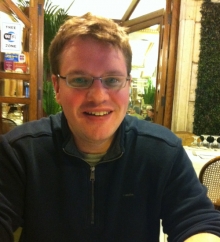 Jason Hawreliak
Jason Hawreliak
Assistant Professor, Game Studies, Brock University
Student Members
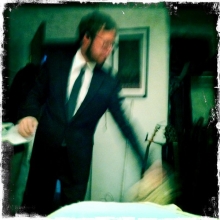 Kent Aardse
Kent Aardse
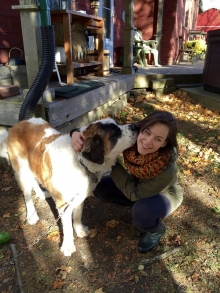 Rebecca Anderson
Rebecca Anderson
English Language and Literature
Becky Anderson, BA (English; French Studies, Waterloo), MA (Literary Studies, Waterloo) is a third-year PhD Candidate at UWaterloo, where she’s also pursuing a concurrent Graduate Diploma in Cognitive Science. She’s the recipient of the Provost Doctoral Entrance Award (2015-2016), a Jack Gray Fellowship (2016-2017), and a President’s Graduate Scholarship (2017-2018). Funded by an Ontario Graduate Scholarship, her dissertation examines how virtual communities are created in massively multi-player online role-playing games and explores what kinds of self-construction emerge in these digital locales and how such self-construction reciprocally affects the living culture of the game. She’s a researcher and Graphic Artist at The Games Institute, an Associate Editor at First Person Scholar, and takes pride in being a professional procrastibaker.
Contact Information:
Email: r3anders
Twitter: @beckyanderson35
Kassandra Arthur
English Language and Literature
Kasandra Arthur, HBA (Lakehead University) and MA (Lakehead University), both with a specialization in Women’s Studies. Kasandra studies young adult literature, particularly the processes in which these texts are adapted to film. She is also interested in fandom studies and the ways in which audiences engage in various media telling the “same” story. Her doctoral research focuses on the relationship between author, audience, and interpretation in the Harry Potter universe. Other interests include gender studies, fantasy literature and literary theory.
Tyler Black
English Language and Literature
Tyler works in the VR storytelling lab by assisting and providing demos where necessary. Additionally, Tyler is researching the communication habits that occur between trans-disciplinary individuals.
Natalee Blagden
English Language and Literature
Natalee is a Master’s student in the English Language and Literature Department at the University of Waterloo.
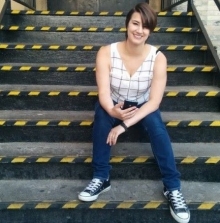 Betsy Brey
Betsy Brey
English Language and Literature
Betsy Brey (BA and MA, University of Minnesota Duluth) is a PhD candidate in the English Language and Literature department, specializing in game studies. Her research focuses on the narratological impacts of game mechanics. In particular, she researches mechanics and storytelling in metagames, virtual reality, and role-playing games. She is also interested in narrative practices in gamification. She is the Editor-in-Chief for FirstPersonScholar. You can find her on Twitter @BetsyBrey.
Pierson Browne
Sociology and Legal Studies
Pierson Browne is a second-year Ph.D. student who has arrived in the Games Institute by way of Concordia University’s M.A. Media Studies program, during which he was an active contributor in two games research institutions: the mLab and the Centre for Technoculture, Art, and Games. Pierson’s history as an aficionado of competitive card games and competitive digital strategy games has guided his academic interest towards metagames—the compelling product of collisions between competitiveness and sociality in the context of play. Pierson has also written on indie developers and has publicly exhibited hacked/modded versions of Minecraft to explore issues surrounding intergenerational sustainability.
Lauren Burr
English Language and Literature
Lauren Burr is a PhD candidate in the English Department at the University of Waterloo studying locative media, augmented/alternate/hybrid realities, and pervasive games. Lauren’s recent collaborative projects include Bonfire of the Humanities, an alternate reality game designed for Congress 2012; Cytopath, an augmented reality necromedia game set in downtown Kitchener; and House of Lexia, a locative hypertext remediation of Mark Danielewski’s House of Leaves. She is also a contributor to the online publication, First Person Scholar. Lauren conducts her research with both the Critical Media Lab and The Games Institute at uWaterloo, and continues to collaborate as an adjunct researcher with the Carleton University Hypertext and Hypermedia Lab after completing an MA at Carleton in 2011. Lauren’s work is funded by the Social Sciences and Humanities Research Council of Canada.
Betty Chang
Systems Design Engineering
Betty Chang received her PhD from the department of Systems Design Engineering in the area of human-computer interaction and human factors. Her PhD work sought to improve users’ awareness of each other and of the situation when they collaborate over computer systems. She studied different technologies such as digital tabletops and multi-device environments, in various contexts including police emergency response, strategic board games, and classrooms.
In one of her projects, a digital tabletop board game was used to study awareness support of automated game events. Tabletops are large horizontal displays with touch surfaces. Digital tabletop games may enforce rules, keep track of scores, and automate mundane tasks. It may also play as the opponent in collaborative board games where players cooperate as a team to defeat the board. However, without appropriate feedback to the players on the game state, they may be confused and unable to strategize. The project investigated interactive information visualizations and widgets to facilitate players’ awareness gathering process. The findings can be applied to other co-located collaborative domains such as emergency response and education.
Read more about Betty’s research on her personal website!
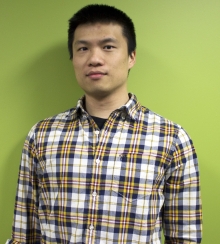 Victor Cheung
Victor Cheung
Systems Design Engineering
PhD candidate from the Systems Design Engineering department at the University of Waterloo. He received his MPhil in Computer Science, B(Eng) in Computer Science Information Engineering from the Hong Kong University of Science and Technology.
He is currently working in the Collaborative Systems Laboratory, co-supervised by Stacey Scott and Ed Lank. His primary research interest is Human-Computer Interaction and its applications in interactive surfaces, particularly in the use of animation and other visual elements in interface design to better attract and guide novice users. In his spare time he also makes awesome coffee and casual games.
Ryan Clement
English Language and Literature
Ryan Clement (MA York University, BA Brandon University) is an English PhD candidate who studies the relationship between emergent narrative and game mechanics and the possible use of this interaction for new forms of education and intercultural communication. He is presently lecturing at the University of Winnipeg, Brandon University, and the International Space University. He worked on the GET-FACTS project, a partnership between the Games Institute and CIHR focused on allergy education. For this project, he designed the Kitchen Table game, a cooperative board game that brings “families and their dietary restrictions together.” In addition to designing board games, he has been a key organizer of events like Make a Game or DIY Trying and the Game Tasting. While most of his more recent experiences in gaming have been more tabletop in nature, he has a strong soft-spot for the old 8-bit classics.
 Shawn DeSouza-Coelho
Shawn DeSouza-Coelho
Shawn DeSouza-Coelho is a Masters student in the Experimental Digital Media program at the University of Waterloo’s Critical Media Lab.
Supervisor: Neil Randall
Judy Ehrentraut
English Language and LiteratureJudy Ehrentraut is a PhD candidate researching the creation of posthuman bodies in virtual and augmented realities through technological embodiment. Her dissertation examines how VR and AR expand notions of presence through mobile smartphones and heads-up displays that physically and cognitively extend the boundaries of the body. She is a research associate at the University of Waterloo’s Critical Media Lab and a resident of the Games Institute. As part of the IMMERSe network, her ongoing work involves the multimodal and interactive components of VR and AR immersion in video games. With the support of the GI, she is currently surveying the synchronic potential of devices that allow users to map their real bodies into virtual game spaces.
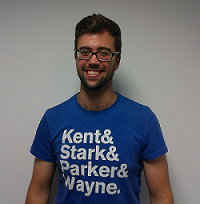 Alex Fleck
Alex Fleck
English Language and LiteratureAlex Fleck is a Masters student in the XDM stream interested in the application of new media (games) criticism to other forms. In particular, he is interested in the transposition of literary works into other media. He enjoys long walks on virtual beaches, and is sometimes sad and sometimes happy to think that because of Bioshock, “Somewhere Beyond The Sea” will never be the same.
 Michael Hancock
Michael Hancock
English Language and Literature
Dr. Michael Hancock is a sessional instructor in the Department of English Language and Literature at the University of Waterloo. His dissertation was on the history of textual representation in videogames, a study which ranges from videogame instruction manuals to the 1989 Amiga game It Came From the Desert. He is interested in three areas of game studies: the appearance of gamic structures in other media, the historical shifts in game design and interpretation, and the formal aspects of video games, as they present themselves to the players. He’s also interested in social applications of digital media in general, and how societies adapt to these new technologies.
Michael’s current research includes videogame adaptation of horror film, the intersection of videogames and the gothic, and narrative and commercial structures in match-3 style games.
He was also a founding member and former Book Reviews Editor for First Person Scholar at the University of Waterloo.
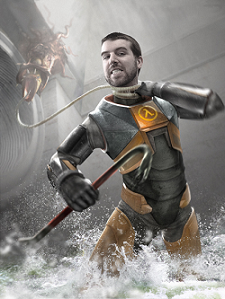 John Harris
John Harris
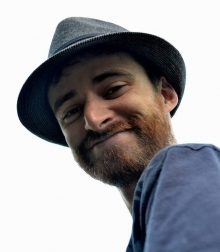 Nicholas Hobin
Nicholas Hobin
English Language and Literature
Nicholas Hobin, BA (King’s University College at WU) and MA (University of Waterloo), is a first-year PhD student curious about video games, narratology, Lovecraftian horror, and Shakespeare. He is currently pursuing questions about the figurative and narrative roles of space in virtual worlds, while considering broader questions of how video games manifest processes of conceptualization.
Chris Lawrence
English Language and Literature
During my undergraduate studies at Carleton I double majored in English Literature and Linguistics, and played a lot of video games. During my Masters in English Literature at Carleton I specialized in science fiction and dystopia, and played a lot of video games. At some point I realized that I ought to combine these interests.
Video games are everywhere now: in books, in film, on your TV, on your phone, in the classroom, in the workplace. I want to make sense of their impact on our lives. People today spend as much time playing games as they might have spent reading books fifty years ago. How does that restructure our cognition? McKenzie Wark summarizes that “Games are no longer a pastime, outside or alongside of life. They are now the very form of life, and death, and time itself.” So “play” isn’t just about play anymore. Play has become work.
I believe that it’s essential to understand how we are using what we learn in games to approach challenges in our real lives. To plead ignorance is to allow external forces to co-opt those influences and manipulate them in their favour. Nick Dyer-Witheford and Grieg de Peuter warn that “video games are a paradigmatic media of empire.” To this I ask: what is our alternative? How can we take this cognitive capital back from the gamified office and leverage it positively? Big questions. I can’t answer them on my own. That’s why I’m here at the University of Waterloo.
 Cayley MacArthur
Cayley MacArthur
Systems Design Engineering
Cayley MacArthur, BKI (Knowledge Integration, Waterloo), MA (English & Systems Design Engineering, Waterloo), is a PhD student in Systems Design Engineering. Her research focuses on human-computer interaction and she is a member of the Touchlab and WaterlooHCI groups. Cayley has captained the Winter and Spring 2017 Game Jams and sits on the Women in Engineering committee as a Graduate representative.
Lesley Northam
Computer Science
Lesley Northam is a Ph.D. student in Computer Science, in the Computer Graphics Lab (CGL). She studies film language, cinematography, stereoscopic 3D and HFR. She is also interested in non-photorealistic rendering.
Amber O’Brien
English Language and Literature
Amber O’Brien is pursuing a Masters in Literary Studies. Her main area of interest is examining how narratives in science fiction and fantasy texts work to challenge and alter gender ideologies in Western societies.
 Alexandra Orlando
Alexandra Orlando
English Language and Literature
Alexandra Orlando (BA and MA, English and Film, Wilfrid Laurier University), is a first year Ph.D. student at the University of Waterloo in the English Languages and Literature department. She is specializing in narratology and game studies. Her research interests include the intersection between film theory and game cinematics, e-sports and East Asian game studies.
Prior to the beginning of the PhD, she worked as a community and project manager with the Collegiate Star League and eSports Canada. She is also the Associate Commentaries editor for First Person Scholar, a middle-state game studies publication.
Rob Parker
English Language and Literature
Rob Parker (MA, Wilfrid Laurier & BA, MA, Waterloo) is a research associate and HASTAC scholar (2013-2014), a contributing editor for First Person Scholar, and has been actively involved with the Games Institute since 2012. He is currently exploring a variety of ways to add Oculus Rift support to Twine games and hosts a semi-regular video series on procedural death labyrinths and genre theory called “Death of the Roguelike.” He is @RobotParking on Twitter and blogs at rapgamebakht.in. He likes making (and playing) dreadful games.
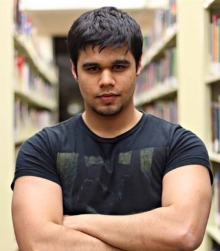 Umair Rehman
Umair Rehman
Systems Design Engineering
MASc. candidate from Systems Design Engineering working as an experimental perceptual psychologist, a quantitative user researcher and a human factors engineer at the Human Optimization and Modelling Lab (HOM Lab). His research focus pertains to human-computer interaction and computer-supported collaboration, where Umair explores interactive processes between technology and humans with the end goal of designing, developing and evaluating high end interfaces and user assistive applications. His most recent research endeavor related to ‘Augmented Reality based Indoor Navigation using 3D Point Cloud Tracking on Google Glass’ was experimented at the Games Institute. Papers related to the research have been accepted for publication in conference proceedings of IEEE Systems, Man & Cybernetics and Human Factors and Ergonomics Society. He is also working to develop training games that can address human supervisory control issues and improve human decision-making in complex sociotechnical and automated systems such as nuclear power plants, air traffic control operations etc.
 Jonathan Rodriguez
Jonathan Rodriguez
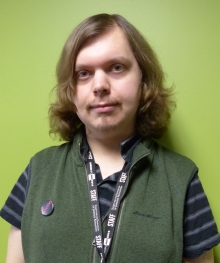 George Ross
George Ross
English Language and Literature
George Ross, BA (Hons.) (Linguistics and Applied Language Studies, Carleton University) and MA (Applied Language Studies, Carleton University) specializes in simulations, organizational rhetoric, and narrative modeling. He is a dedicated player and modder of aviation and military sims, strategies and management games, and an advocate for virtual organizations and remix cultures (in games and other media). His previous research includes work in business and medical communication, technical and military discourse, critical media analysis, cross-cultural semantics, ethnographies of online communities, gaming history, writing pedagogy, and traditional linguistics (particularly minimalist syntax and morphology). He also teaches business writing and presentation skills elsewhere at UW, helps manage a virtual airline, and volunteers as tech and programming support for fan video showcases at conventions across Canada and the US.
Supervisor: Neil Randall
 Gustavo Tondello
Gustavo Tondello
Computer Science
Gustavo Tondello is a Ph.D. student at the University of Waterloo under supervision of Dr. Lennart Nacke and Dr. Daniel Vogel and researcher at the HCI Games Group and the Games Institute. His main interests include gamification and games for health and learning. His research focuses on the design and personalization of gameful applications. He earned his M.Sc. in Computer Science and his B.Sc. in Information Systems from the Federal University of Santa Catarina (UFSC), Brazil. His recent publications include works on player and user motivations in games and gameful applications, as well as frameworks and approaches to designing personalized gameful applications and serious games. He periodically blogs about gamification for the HCI Games Group, the ACM XRDS magazine, and on his personal blog, Gameful Bits. Before coming to Canada, Gustavo worked for several years as a Software Engineer in Brazil. Gustavo is also a Logosophy researcher affiliated to the Logosophical Foundation of Brazil and North America.
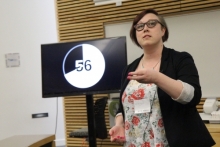
Elise Vist
English Language and Literature
Elise Vist, BA and MA (English, Carleton University), is a Ph.D. candidate studying fans, immersion, and queerness. Her research focuses on hockey fans and Real Person Fanfiction, but she has also written about immersion and queerness in games, including dys4ia, Dragon Age: Inquisition, Lord of the Rings: Online, and the worldwide scavenger hunt GISHWHES. She is also passionate about creative and playful game design, running workshops using University of Alberta’s Cobble Cards. As a co-founder of the Games Institute Janes (GI Janes), Elise encouraged women and non-binary people to find joy in gaming.
Emma Vossen
English Language and Literature
Emma Vossen is a PhD candidate currently writing a dissertation examining how accessible games and gaming/gamer culture is to women. Her research is specifically examining how comfortable women feel playing, talking and writing about games in both physical and virtual spaces and how this determines who enters and becomes a part of gamer culture.
She has published on the accessibility of pornography for women and the Fifty Shades of Grey series, romance and sex in The Walking Dead comic and games, and the fetish art of Superman’s co-creator Joe Shuster. She was the commentaries editor of First Person Scholar and took over the role of FPS Editor in Chief in the fall of 2015. You can read various bits of her writing about Zelda, harassment in games spaces, and The Walking Dead game on FPS as well. She is the co-founder of the Games Institute Janes (GI Janes) and has been organizing monthly gaming events for women in the Games Institute.
 Diane Watson
Diane Watson
Computer Science
Diane Watson is a PhD candidate in the Cheriton School of Computer Science at the University of Waterloo. Her focus is on Gamification, in particular, how positive behaviours can be encouraged through games. She has been involved in the design of several games, including Reading Garden, a motivational game that encourages undergraduate students to participate in self-study activities such as reading the text book; and Above Water a mental health awareness game.
 Rina Wehbe
Rina Wehbe
Rina R. Wehbe is working towards a Ph.D. Computer Science, Cheriton School of Computer Science. Her affiliations include HCI Games Group, and the Games Institute.
Her research focuses on understanding difficulty and learning in games and productivity applications. Specific topics include comprehension and points of confusion detrimental to the User eXperience (UX), balancing help functionality to ensure the user is not needlessly interrupted. Despite her cognitive focus, she continues to have a soft spot for affective computing, which includes her work on emotional attachment to digital objects and characters. Furthermore, her research into Games for Change seeks to inspire, motivate, and spur small changes that can add up to bigger differences.
Amber West
English Language and Literature
Amberly H. West, (BA and MA University of Waterloo) researches games for health. Her secondary research areas include adaptations, rhetoric, and new media studies. Under the supervision of Dr. Neil Randall and Dr. Mark Hancock, she and Rebecca Langer (Computer Science) have been working on a multi-disciplinary research project for which the team researched, designed, and developed a prototype of a game that teaches children to identify and manage food allergies. Her future research will expand on the foundation created by this project, focusing on researching existing games, game design, and health studies to propose games that will assist in the process of rehabilitation.
 Steve Wilcox
Steve Wilcox
English Language and Literature
Steve Wilcox is a PhD candidate in the English department at the University of Waterloo where he studies empathy, videogames, comics, and rhetoric. His focus is on the use of media for translating knowledge between bodies, communities, and cultures. He is also one of the 25 grad students across Canada to win a $3000 SSHRC award in the “Research for a Better Life: The Storytellers” competition.
Wilcox is currently researching the relationship between language, media, and normativity. More specifically, he is interested in how media defines and replicates a normative definition of reality and how this impacts what we think of as abnormal and disabled.
He is co-founder and former editor-in-chief of First Person Scholar, a middle-state publication on games studies. He also creates and distributes various digital media projects on his blog at TheDEWLab.com. Steve has also created Allergies and Allegories, a web-based game designed to raise awareness of food allergies as part of his dissertation.
Community Members
Gina Angelea
While currently working as freelance web, digital, and marketing designer, Gina continues to look for new opportunities to put her passion for presentation and design to good use.Introduced to the Game Institute through attending THATcamp 2013, she became a principal designer in the camp’s follow up gamification project for the “Surface Tension” water exhibit at THEMUSUEM (co-sponsored by the GI). Previously, Gina worked a tech manager and corporate trainer for over ten years before deciding to branch out on her own, and focus on new projects that would put her creative desires to more fulfilling projects.As an avid gamer, Gina enjoys following game politics, with a focus on ethics, gender, and social issues. She has a long standing passion for development, playability, design, and marketing of games.
Gina has a passion for visual creative development projects, with a dedicated focus on quality: “the little details”, and “design with purpose”. She is currently involved with several personal, and team projects – and she enjoys reaching out and working with groups where her passion for games and design can be helpful. Gina is also currently working on a long term project to develop a new style story-arc based video game engine, and using fuzzy-logic and psychology based markers to developer better, more engaging NPCs (to enhance the player game and role-play experience).
 Erica Robinson
Erica Robinson
Designer
Erica is a filmmaker and designer. She has just completed a film called “John Orpheus is Dead” which is part of a multidisciplinary collaboration that includes an album, concerts, music videos and even a jewellery line called Gada Chainz.
She made the music videos, directed the shows and creative directed the entire project. With a masters degree in drama from the University of Guelph, she started her career as a theatre director and dramaturge. She now makes music videos, films and is currently working wit the Games Institute and the Institute for Quantum Computing on an interactive tour of a Physics Lab. She is commonly known by her nickname, Gada Jane.

